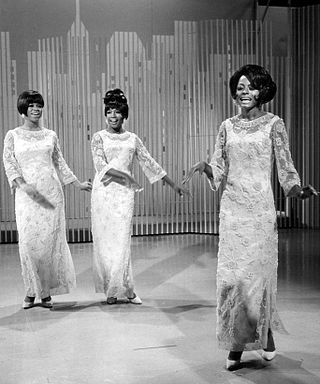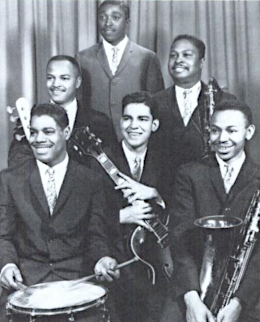
The Supremes was an American girl group and a premier act of Motown Records during the 1960s. Founded as the Primettes in Detroit, Michigan, in 1959, the Supremes were the most commercially successful of Motown's acts and the most successful American vocal band, with 12 number-one singles on the Billboard Hot 100. Most of these hits were written and produced by Motown's main songwriting and production team, Holland–Dozier–Holland. It is said that their breakthrough made it possible for future African-American R&B and soul musicians to find mainstream success. Billboard ranked the Supremes as the 16th greatest Hot 100 artist of all time.

The Funk Brothers were a group of Detroit-based session musicians who performed the backing to most Motown recordings from 1959 until the company moved to Los Angeles in 1972.

Come and Get These Memories is the debut album by the American girl group Martha and the Vandellas, released in 1963. Put out by Gordy after the success of the trio's hit of the same name, the album also contains the group's debut single, "I'll Have to Let Him Go", which was originally intended for Mary Wells, and "A Love Like Yours ". Most of the album was produced by Holland–Dozier–Holland and William "Mickey" Stevenson.

Meet the Supremes is the debut studio album by The Supremes, released in late 1962 on Motown.

"Beechwood 4-5789" is a song written by Marvin Gaye, William "Mickey" Stevenson and George Gordy. It was a 1962 hit single for the Motown girl group The Marvelettes on Motown's Tamla subsidiary record label. The song became a hit again when it was covered by the pop duo The Carpenters in 1982.
"(You're My) Dream Come True" is a 1962 single by The Temptations. The single is notable for being both The Temptations' first nationally charting single and the first release on Motown Records' Gordy Records imprint. The Temptations' future recordings for Motown would be issued on Gordy until the label was deactivated in the 1988 merger. Previous Temptations recordings had been issued on Motown's Miracle Records imprint, which was deactivated and reorganized as Gordy Records to avoid confusion with Motown's Miracles singing group.

"Your Heart Belongs to Me" is a 1962 song written and composed by The Miracles' William "Smokey" Robinson and released as a single by Motown singing group The Supremes during their early years with the label. The song is about a woman whose lover is in the armed forces and has "Gone to a far-away land"; its narration has her tell him to always remember their love for each other if he ever gets lonely.
"Let Me Go the Right Way" is a 1962 song written and produced by then Motown president Berry Gordy and released as a single by Motown singing group The Supremes. It was the group's fourth single and their second charted record following the dismal reception of their first charted single, "Your Heart Belongs to Me".
"A Breathtaking Guy" is a 1963 song written and produced by Smokey Robinson and released first by Motown singing group The Supremes (1963) and later by The Marvelettes (1972). The single was originally released under the title "A Breath Taking, First Sight Soul Shaking, One Night Love Making, Next Day Heartbreaking Guy" by The Supremes, but was shortened after its official release. All three Supremes members - Diana Ross, Florence Ballard and Mary Wilson - sang the chorus with the original title together.

"When the Lovelight Starts Shining Through His Eyes" is a song written by Holland–Dozier–Holland and recorded in 1963 by Motown singing group The Supremes. It is notable as the Supremes' first Billboard Hot 100 Top 40 recording, following seven previous singles between January 1961 and September 1963 which failed to enter the Top 40. The single is also notable as the first Supremes single written and produced by Holland–Dozier–Holland, who had previously created hits for Martha and the Vandellas and Mary Wells.

Bye Bye Baby I Don't Want to Take a Chance is the debut album by Motown recording artist Mary Wells, released on Motown in 1961. The album didn't chart but yielded two hit singles for the teenaged Wells including "Bye Bye Baby", issued in late 1960, and "I Don't Want to Take a Chance", a song written for her by Berry Gordy and Mickey Stevenson. Wells' follow-up album, The One Who Really Loves You, was released in 1962.
"Buttered Popcorn" is a 1961 song written by Motown president Berry Gordy and songwriter Barney Ales, produced by Gordy, and released as a Tamla label single by Motown singing group The Supremes. It was the group's second single after signing with Motown Records as well as their second, and last, single for the Tamla label, before moving to the Motown label.
"Tears of Sorrow" is the first single by The Primettes, later known as The Supremes, released in 1960. This was their first and only single from Lu Pine Records. "Tears of Sorrow," along with the Mary Wilson-led "Pretty Baby", are the only known recordings that feature the vocals of Betty McGlown. It would later appear on the 2000 box set The Supremes. The Supremes would later rerecord the song at Motown, but this version would go unreleased until the 2008 compilation album Let The Music Play: Supreme Rarities 1960-1969.
"After All" is a 1960 song written by Smokey Robinson and originally recorded and released by The Miracles on the Tamla label. It was first recorded as an unreleased single by The Supremes for Tamla; it was supposed to be their first single but it was canceled in favor of "I Want a Guy", and their cover wasn't released until it appeared on the 2000 box set, The Supremes. The song is noted for both groups' unusual choices for leads. For the Miracles' version it serves as a rare lead for Claudette Rogers Robinson, instead of the group’s main lead, Claudette's husband, Smokey Robinson. In the Supremes' case it is their only single to feature Barbara Martin singing on lead vocals. Florence Ballard, Mary Wilson, and Diana Ross sing verses, and Martin sings the bridge. "After All" was also later covered by The Marvelettes, in the early 1970s, with group member Wanda Young Rogers as lead. Their version appears on the album The Return of the Marvelettes, and later became the group's belated final single.

Please Mr. Postman is the 1961 studio debut album from Motown girl group The Marvelettes and the sixth album ever released by the company. The focal track is the number-one hit single, "Please Mr. Postman". The album notably features cover versions of label mates The Miracles' "Way Over There" and "I Want a Guy", which was the debut single for fellow Motown girl group The Supremes the same year, and their cover had served as the b-side to "Twistin' Postman" the less successful follow-up to "Please Mr. Postman." Although the original version by The Supremes flopped, The Marvelettes' cover became a regional hit.

Playboy is the third album by the Motown girl group The Marvelettes, released in 1962. It capitalized on their hit singles "Playboy" and "Beechwood 4-5789". It also includes the single "Someday, Someway" and "Forever", a heartfelt standard that would be released the following year as the B-side of the single "Locking Up My Heart" and join the A-side on the charts. Other compositions include "Goddess of Love", "Cry Over You", and "Mix It Up". George Gordy, William "Mickey" Stevenson and Marvin Gaye, who had produced "Beechwood 4-5789" all did some work on the Playboy LP as well.
"Mother Dear" is a 1965 song recorded by the Supremes for the Motown label.

"Where Did Our Love Go" is a 1964 song recorded by American music group the Supremes for the Motown label.
"Too Hurt to Cry, Too Much in Love to Say Goodbye" is a 1963 song and single written and composed by Motown's main production team Holland–Dozier–Holland. Credited to the Darnells, the performers on both sides of the single were the Andantes, Holland–Dozier–Holland, Mary Wilson of the Supremes (B-side), and members of the Marvelettes, the Four Tops, and the Temptations. Nobody involved with the production on either side was pleased with the false credit. The single peaked at number 17 on the Billboard Bubbling Under Hot 100 chart.
"I'll Have to Let Him Go" is a 1962 song and single written, composed and produced by William "Mickey" Stevenson and issued on the Gordy (Motown) label. it is notable for being one of two singles that marked the Motown debut of Martha and the Vandellas. The song is about ending a romantic relationship, as its narrator, after seeing her lover kissing and holding another, realizing its over and decides she going “to set him free” even though "it's gonna hurt (her) so".










